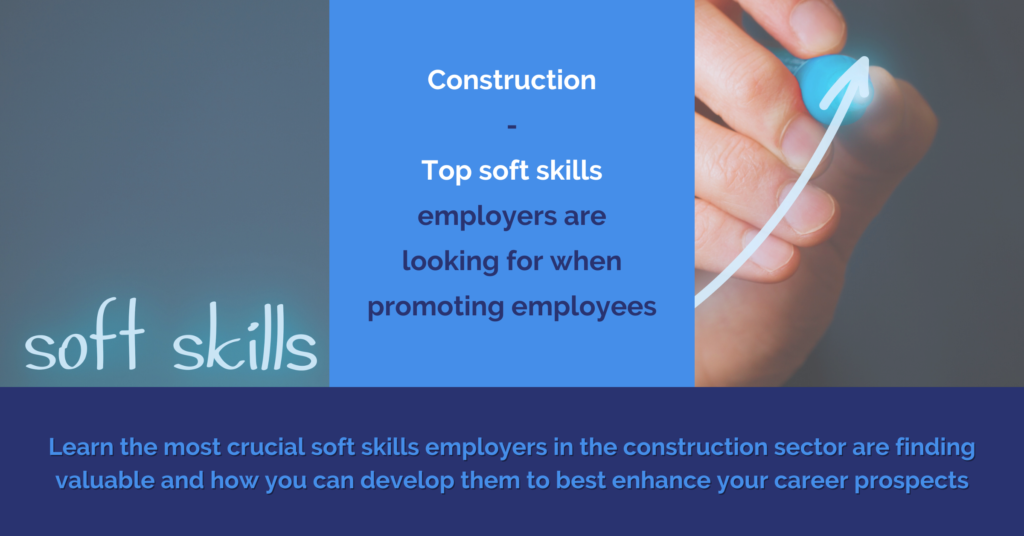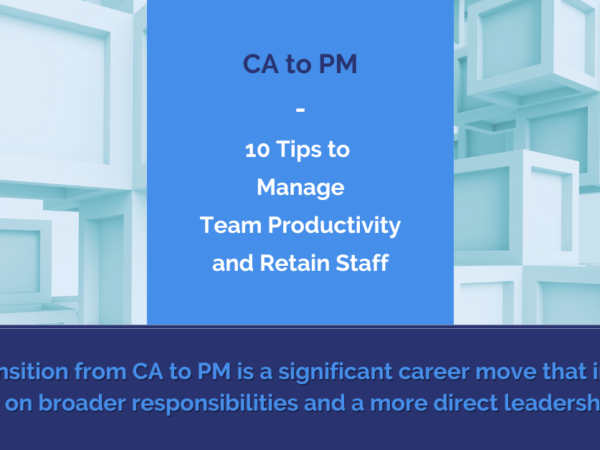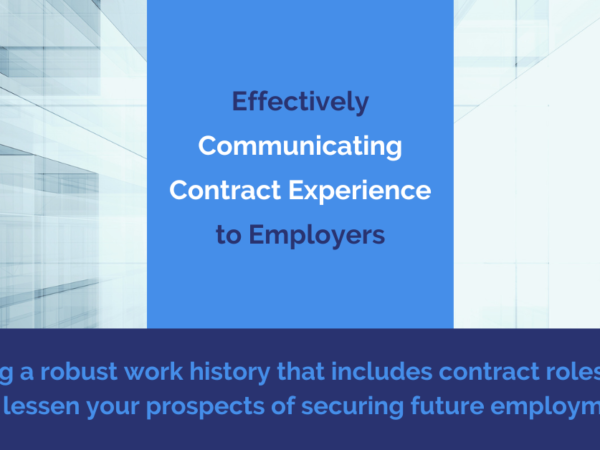In the construction industry, technical proficiency is a given. Employers expect candidates to possess the necessary hard skills and certifications to execute their tasks efficiently. However, what often sets top candidates apart is a strong grasp of soft skills. These are the intangible qualities that influence how individuals approach work, interact with colleagues, and navigate complex projects.

Here we explore the most crucial soft skills that employers in the construction sector are finding increasingly valuable and how you can go about developing them to best enhance your career prospects.
Emotional Intelligence (EI)
There has been a lot of talk about Emotional intelligence over the last few years, especially with the impact of Covid on people’s lives and the ability to manage stress, demonstrate empathy, provide support, and being able to adapt under changing circumstances. In a nutshell EI is the ability to understand and manage your own emotions, as well as those of others. In construction, this skill is invaluable for fostering a collaborative and harmonious work environment.
To hone your emotional intelligence, start with practising empathy by genuinely trying to understand things from the perspective of others, which involves active listening and showing interest in their concerns. This means paying attention to not just their words but also their tone, body language, and emotions to interpret the underlying message.
Also, learn self-regulation to control your emotions, especially in stressful situations. Being calm in stressful situations is one of the top qualities managers look for as it often leads to better decision-making, reduces workplace tension, and provides a more stable, productive environment. By employing techniques like deep breathing, mindfulness, or taking a moment to think before reacting, you can improve your self-control and raise your standing amongst your managers by showing you have the ability to manage your reactions under pressure.
And improve your social skills by seeking feedback on your interactions. Understanding and managing relationships effectively can prevent conflicts and build stronger, more cooperative teams.
Effective Communication
Communication is the backbone of any successful construction project. Misunderstandings can lead to major problems (such as delays in project timelines), making it essential to have a good grip on both verbal and non-verbal communication.
To improve your communication skills, make it a habit to listen more than you talk, allowing the other person to make their point fully before you respond even if you know what they’re going to say next, which shows respect and ensures you understand their perspective and concerns.
Practice conveying your messages clearly and concisely by organising your thoughts before speaking, using simple language by avoiding ambiguity and jargon when speaking to individuals who may not be familiar with some technical terms, and focusing on the essential points without venturing into unnecessary details.
Also, enhance your non-verbal communication by being aware of your own body language, facial expressions, and eye contact. By using open and positive body language you are showing you are approachable and attentive. For instance, smiling can indicate friendliness, maintaining eye contact shows interest, uncrossed arms can signal openness and approachability, and leaning forward can indicate that you are actively listening. You can also use non-verbal cues like nodding and verbal affirmations such as ‘I see’, ‘I understand’, or ‘That makes sense’ to show you’re engaged.
When receiving instructions or feedback, summarise and repeat what you’ve heard to confirm your understanding. This practice, known as reflective listening, can prevent miscommunication and ensure that all parties are on the same page.

Problem-Solving and Critical Thinking
Construction projects often encounter unexpected challenges, making the ability to think on your feet and devise effective solutions a highly valued skill.
To enhance your problem-solving abilities, develop your analytical thinking by breaking down complex problems into smaller, manageable parts and analysing each component to understand the root cause. This involves asking the right questions and using logical reasoning to dissect issues. Depending on the situation, asking the right questions could look like the following:
Clarifying Questions
- “What specific part of the process is causing the delay?”
- “Can you provide an example of when this issue typically occurs?”
Probing Questions
- “Why do you think this problem keeps happening?”
- “What are the possible consequences if this issue is not resolved?”
Root Cause Questions
- “What changed recently that might have triggered this problem?”
- “Has this problem occurred before, and if so, how was it resolved?”
Impact Questions
- “How is this issue affecting the overall project timeline?”
- “What is the financial impact of this problem on the budget?”
Solution-Oriented Questions
- “What resources are needed to address this problem?”
- “Are there any alternative methods we haven’t considered yet?”
Hypothetical Questions
- “What would happen if we implemented this change?”
- “If we remove this step from the process, how might it impact the outcome?”
Also, embrace creative thinking by suggesting innovative ideas or approaches when conventional solutions fall short. Sometimes, a fresh perspective can lead to more efficient and effective solutions.
Adopt a systematic approach to decision-making by considering the potential impact of each option, weighing the pros and cons, and choosing the one that aligns best with project goals and constraints.
And, it’s also useful to engage in scenario planning to anticipate potential issues and prepare strategies for resolving them. For instance, if you had a plan three years ago for operating during a worldwide economic meltdown, how valuable would it have been?
Adaptability and Flexibility
Construction projects are often subject to changes in scope, design, and schedule. Employers promote staff who can adapt to these changes.
To become more adaptable, maintain an open-minded attitude, being receptive to new ideas and approaches, which can help you adjust to new technologies and methodologies. This means being willing to learn continuously and embracing change rather than resisting it.
Cultivate your resilience by staying focused and maintaining a positive attitude even when faced with setbacks. Building mental toughness can help you recover from challenges more quickly and keep projects moving forward.
Enhance your multitasking skills by prioritising effectively, staying organised, and using tools like to-do lists to manage multiple tasks simultaneously. This can help you juggle various responsibilities without becoming overwhelmed.

Teamwork and Collaboration
Construction is inherently a team effort, and the ability to work well with others is essential for delivering projects that are successful.
To improve your teamwork and collaboration skills, be reliable so your team can count on you, which builds trust and fosters a collaborative atmosphere. This involves consistently meeting deadlines, following through on commitments, and being accountable for your actions.
Address conflicts constructively by focusing on finding solutions rather than assigning blame. Use conflict resolution strategies such as active listening, mediation, and compromise to resolve disputes as best you can.
Show respect for your colleagues’ skills and contributions, acknowledging their efforts and offering assistance when needed to maintain a positive working environment.
And, foster a culture of mutual respect by valuing diversity and encouraging inclusive practices within your team, such as mentoring newcomers, and encouraging inclusive planning on projects by seeking input from all appropriate team members, ensuring that diverse perspectives are considered.
Leadership and Influence
Even if you’re not in a managerial position, demonstrating leadership qualities can significantly enhance your career prospects. Leadership in construction is about guiding your peers and contributing positively to the project.
An important part of leadership is setting the right example through your work ethic and attitude. Show enthusiasm, dedication, and a strong commitment to quality in your work.
Show confidence in the team’s abilities by delegating tasks to them, giving them the opportunity to take ownership, develop new competencies, and showcase their capabilities.
If you’re in a position to do so, communicate a clear outcome for the project, helping your team understand their roles in achieving the overall objectives. Use motivational techniques such as verbal recognition of achievements and provide constructive feedback to encourage continuous improvement and maintain high morale.
Steps to Help Develop These Skills
- To develop these essential soft skills, find a mentor who exemplifies the soft skills you wish to develop, learning from their experiences and seeking their advice on handling specific situations.
- Ask if there is an opportunity to participate in workshops and training programs focused on soft skills development in communication, leadership, and emotional intelligence.
- Make a conscious effort to practice empathy in your daily interactions, trying to understand your colleagues’ viewpoints and responding thoughtfully.
- regularly assess your abilities and identify areas for improvement, seeking feedback from colleagues and supervisors to gain insights into your strengths and weaknesses.
Conclusion
In the competitive field of construction, technical skills alone are simply not enough. Employers require well-rounded staff who possess strong emotional intelligence, effective communication skills, problem-solving abilities, and who are collaborative employees.
By actively working on these soft skills, you can differentiate yourself from the competition and position yourself as a valuable asset to any construction team. Remember, these skills are not just inherent traits but can be developed over time with practice.
Looking for your next construction job? Search our current construction roles here, or to chat with our team about securing your next opportunity, get in contact with us through our Contact Us page.
Receive our updates straight to your inbox



